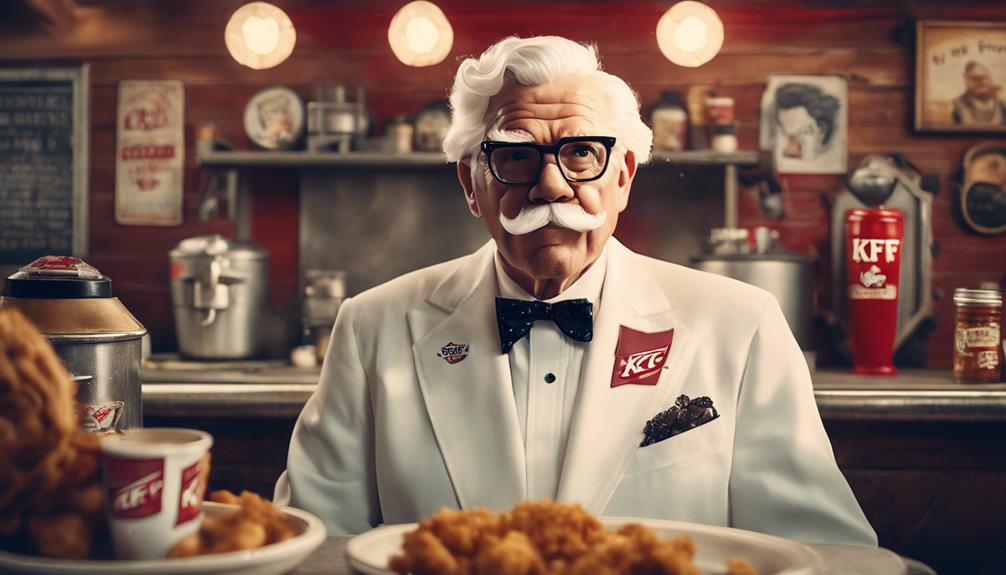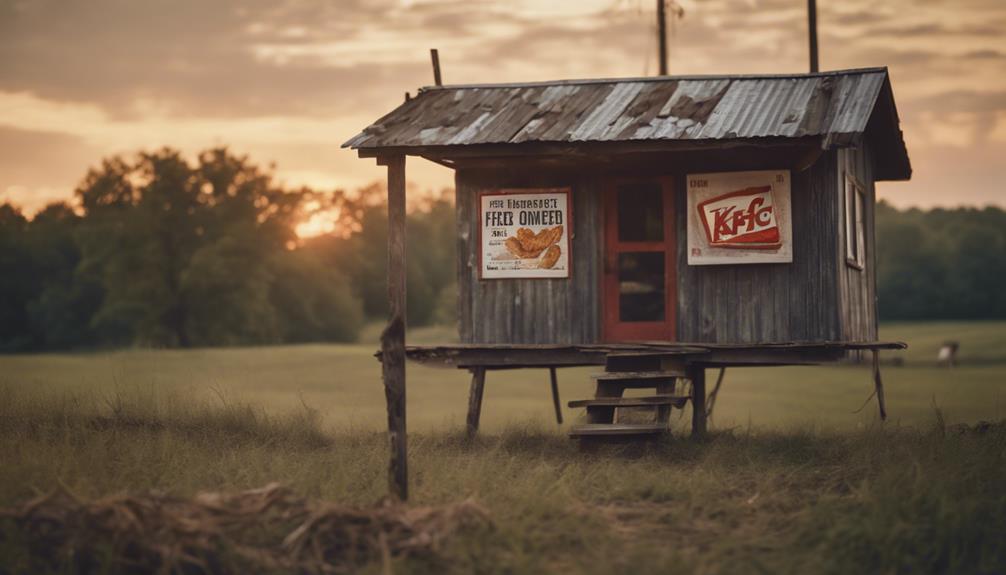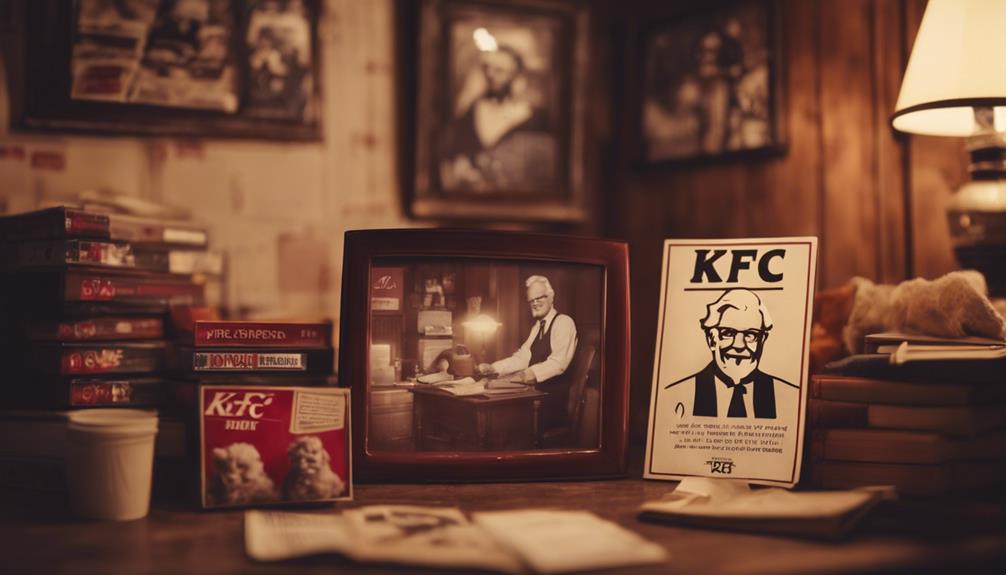Colonel Sanders' story is one of resilience and innovation. He faced numerous failures before launching KFC, starting with a service station that served meals and sparked his passion for cooking. His commitment to quality became a cornerstone of the brand, emphasized by his secret recipe of 11 herbs and spices. Sanders' Southern heritage and persona enhanced KFC's relatability, making it a beloved global brand. Through strategic partnerships and a focus on community, he transformed a roadside eatery into an iconic fast-food chain. There's much more to uncover about his journey and impact on the fast-food industry.
Key Elements

In examining Colonel Sanders' journey, the key elements of his business model emerge as essential to understanding KFC's growth.
The company overview highlights its unique branding and operational strategies, while the business overview outlines its path to success in a competitive market.
Additionally, insights for franchisees offer valuable guidance for those looking to replicate Sanders' achievements in the fast-food industry.
Company Overview
Key elements of a company overview include its mission statement, core values, target market, and unique selling propositions that collectively define its identity and strategic direction.
Colonel Sanders' brand exemplifies this through its commitment to quality fried chicken and customer satisfaction. KFC's mission focuses on delivering delicious meals while fostering a welcoming atmosphere.
The company values integrity, innovation, and community involvement, aiming to connect with diverse consumer demographics. KFC primarily targets families and individuals seeking affordable, convenient dining options.
Its unique selling proposition lies in the secret blend of 11 herbs and spices, which distinguishes it from competitors.
This combination of mission, values, and market focus showcases KFC's enduring legacy and strong brand positioning in the fast-food industry.
Business Overview
A thorough business overview outlines essential components such as mission, values, target market, and unique selling propositions that define a company's identity and strategic direction.
Colonel Sanders built KFC on a foundation of quality and consistency, emphasizing his secret recipe of 11 herbs and spices as a key differentiator.
The mission focused on providing delicious, accessible comfort food to families across America.
KFC targeted a diverse customer base, appealing to various demographics with its value offerings and meal bundles.
Sanders' personal brand, characterized by his Southern gentleman persona, enhanced the company's image, making it relatable and trustworthy.
These elements combined to create a compelling narrative that positioned KFC as a leader in the fast-food market, driving its ongoing success.
Information for Franchisees
Franchisees looking to join KFC must understand the brand's commitment to quality, consistency, and the unique operational standards that have driven its success.
KFC offers extensive training programs that equip franchisees with essential skills, covering everything from food preparation to customer service. Franchisees also benefit from a well-established supply chain, ensuring access to high-quality ingredients.
Furthermore, KFC's marketing strategies provide franchisees with the tools needed to attract customers effectively. Franchisees must adhere to strict operational protocols to maintain brand integrity and customer satisfaction.
The brand's ongoing support, including regular evaluations and feedback, fosters a collaborative environment that encourages growth. Ultimately, dedication to KFC's core values is vital for franchisees aiming to thrive in this competitive landscape.
Company Overview

The company overview of KFC highlights Colonel Sanders' rocky start in entrepreneurship, marked by numerous failures before he found success.
His unwavering commitment to quality and strategic partnerships played an essential role in shaping the brand's identity.
Additionally, understanding KFC's competitive market landscape reveals the challenges and opportunities that defined its growth.
Colonel's Early Entrepreneurial Failures
Throughout his early career, Colonel Sanders faced numerous entrepreneurial failures that shaped his resilient spirit and ultimately led him to the restaurant industry. He dabbled in various jobs, including law, insurance, and tire sales, but his endeavors often ended poorly due to unwise decisions and confrontational behavior.
This tumultuous journey pushed him toward self-employment, a path that suited his independent nature. Despite setbacks, Sanders remained determined, eventually opening a service station where he served meals. His passion for cooking and hospitality began to flourish, setting the stage for his future success.
These early failures taught him valuable lessons about perseverance and adaptability, traits that would later define his legendary career in the restaurant business.
Colonel's Commitment to Quality
Sanders' early experiences in self-employment ignited a relentless commitment to quality that became the cornerstone of KFC's identity. From the outset, he insisted on using only the finest ingredients, believing that good food could create loyal customers.
His secret recipe of 11 herbs and spices exemplified this dedication, carefully crafted to guarantee every bite delivered consistent flavor. Even after selling KFC, Sanders remained deeply invested in the brand's reputation, often publicly critiquing the company's shift away from his standards.
His unwavering belief in quality not only defined KFC but also helped it grow into a global phenomenon, proving that maintaining high standards can secure lasting success in a competitive market.
Colonel's Influential Business Partners
Colonel Sanders' journey to success was greatly shaped by influential business partners who shared his vision for quality and expansion.
Significantly, Pete Harman, who owned the first franchised KFC, played a vital role in establishing the brand's identity and operational model. Their collaboration led to the development of the iconic bucket meal, which appealed to consumers.
Additionally, the partnership with franchisee operators allowed Sanders to expand KFC nationally, solidifying its presence in the fast-food industry.
These partners not only supported Sanders financially but also embraced his commitment to quality, ensuring that the brand's values remained intact as it grew.
Together, they helped transform a small roadside restaurant into a global phenomenon that still resonates today.
KFC's Competitive Market Landscape
KFC's competitive market landscape reflects the brand's evolution from a single roadside restaurant to a leading global fast-food chain, driven by strategic partnerships and a commitment to quality.
Today, KFC faces fierce competition from other fast-food giants like McDonald's and Popeyes, each vying for consumer loyalty.
By leveraging its iconic branding and unique recipe, KFC differentiates itself in the crowded marketplace.
The company's focus on diverse menu offerings and localized strategies helps it cater to various tastes and preferences worldwide.
Additionally, KFC's innovative marketing campaigns effectively engage younger audiences, ensuring they remain relevant.
As the fast-food industry continues to evolve, KFC's ability to adapt and retain its core values will be vital for maintaining its competitive edge.
Brand Identity

Colonel Sanders built KFC's brand identity around a strong Southern heritage that resonated with many consumers.
His unwavering commitment to quality ingredients and the mystique of his signature secret recipe helped establish KFC as a trusted and beloved fast-food choice.
Through these elements, Sanders created a lasting legacy that still influences the brand today.
Southern Heritage Appeal
Southern heritage often plays a pivotal role in shaping brand identity, enhancing consumer connections through nostalgia and tradition.
Colonel Sanders cleverly capitalized on this appeal, presenting himself as the quintessential Southern gentleman. His persona, complete with white suit and string tie, evoked images of Southern hospitality and warmth.
This branding strategy resonated deeply with consumers, fostering loyalty and an emotional bond with KFC. The title of Kentucky Colonel further solidified his connection to Southern culture, giving his brand an air of authenticity and legitimacy.
Commitment to Quality Ingredients
The commitment to quality ingredients has been a cornerstone of the brand identity that sets KFC apart in the fast-food landscape.
Colonel Sanders' insistence on high standards for his chicken laid the foundation for KFC's success. He understood that using fresh, quality ingredients wouldn't only enhance flavor but also build customer trust. This dedication resonates with consumers who seek authenticity in their meals.
KFC's sourcing practices reflect this philosophy, ensuring that the chicken is raised without antibiotics and fed a vegetarian diet. By consistently prioritizing quality, KFC cultivates a loyal customer base that values the integrity of the food they consume.
This unwavering focus on quality ingredients continues to define KFC's reputation in a competitive market.
Signature Secret Recipe
KFC's signature secret recipe of 11 herbs and spices remains a defining element of its brand identity, shrouded in mystery and intrigue. This closely guarded formula, locked away in a vault, has become synonymous with KFC's image, drawing customers in with its promise of a unique flavor.
Colonel Sanders himself claimed that the recipe was no longer used as he intended, creating a rift between his vision and the company's direction. However, KFC continues to leverage the allure of the secret recipe in its marketing, emphasizing tradition and authenticity.
Information for Franchisees

Franchisees should understand that success hinges on adhering to the brand's standards while effectively engaging with their local market. They need to familiarize themselves with KFC's operational procedures, from food preparation to customer service, ensuring consistency across all locations.
Building a strong team is essential; training employees to embody the brand's values enhances the customer experience. Franchisees should also leverage marketing strategies that resonate with their local demographics, adapting promotions and events to draw in customers.
Regular communication with KFC's corporate team can provide valuable insights and support. By staying informed about industry trends and customer preferences, franchisees position themselves for sustained growth while contributing to the overall brand reputation of KFC.
Financial Requirements & Ongoing Fees

When considering a franchise with KFC, potential owners must understand the financial landscape that includes startup capital requirements and initial investment costs.
Ongoing fees, such as royalties for brand usage and marketing contributions, also play a critical role in maintaining brand consistency and market presence.
These financial obligations can greatly impact a franchisee's profitability and operational decisions.
Startup Capital Requirement
Understanding startup capital requirements is vital for entrepreneurs, as these financial needs encompass both initial investments and ongoing operational fees.
For Colonel Sanders, establishing KFC required significant funding, not just for equipment and ingredients but also for marketing and brand development.
Ongoing fees like rent, utilities, and employee wages can strain cash flow, particularly in the early stages.
Additionally, franchisees must consider royalty fees and advertising contributions, which are important for maintaining brand consistency and visibility.
By accurately evaluating these financial obligations, entrepreneurs can create a sustainable business model that facilitates growth while maneuvering challenges.
Proper planning helps guarantee that funds are allocated efficiently, ultimately leading to a more resilient and profitable venture.
Initial Investment Requirement
Determining the initial investment requirement for a new venture involves evaluating both upfront costs and ongoing operational fees essential for sustaining business activities.
For Colonel Sanders, launching KFC required significant capital to cover equipment, restaurant space, and initial inventory.
Investors needed to factor in costs related to branding, marketing, and training staff to guarantee consistency in product quality.
Additionally, ongoing fees, such as royalties and supply chain expenses, played a key role in the financial landscape.
These fees often dictated cash flow and profitability, impacting the long-term viability of the franchise.
Understanding these financial requirements was critical for potential franchisees looking to emulate Sanders' success while steering through the competitive fast-food market.
Ongoing Franchise Revenue Share
Ongoing franchise revenue share requires careful consideration of fees that affect profitability and sustainability in the fast-food industry. Franchisees typically pay a royalty fee, which is a percentage of gross sales, ensuring the brand's continued support and development. These fees can vary, impacting the franchisee's bottom line.
Additionally, franchisees may incur other ongoing costs, such as technology fees, supply chain contributions, and operational expenses, which are critical for maintaining quality and consistency. Understanding these financial obligations is essential for franchisees to project future earnings accurately.
Ultimately, balancing these fees against sales performance determines the franchise's long-term viability, making it important for franchisees to manage their finances wisely while adhering to brand standards.
Marketing Contribution Expenses
In addition to royalty fees, franchisees must also account for marketing contribution expenses, which play a significant role in maintaining brand visibility and competitiveness in the fast-food market.
These expenses typically fund national advertising campaigns, promotional events, and digital marketing efforts that enhance the brand's reach. By pooling resources, franchisees contribute to a collective marketing strategy that benefits all locations, creating a unified brand image.
This approach not only drives customer engagement but also fosters loyalty, encouraging repeat business. Franchisees need to budget for these contributions alongside operational costs, ensuring they remain aligned with the brand's marketing goals.
Ultimately, effective marketing contributions are essential for sustaining growth and reinforcing the franchise's position in a crowded marketplace.
Royalties for Brand Usage
Franchisees must pay royalties for brand usage, which are essential financial requirements that support the overall brand's development and marketing efforts.
These royalties typically range from 4% to 6% of gross sales, providing a steady revenue stream that helps maintain brand consistency and visibility.
This ongoing fee structure allows KFC to invest in advertising campaigns and promotional activities that benefit all franchisees collectively.
Additionally, franchisees are often required to contribute to a national marketing fund, ensuring that the brand remains competitive in a crowded market.
Financing Options

In exploring financing options for aspiring franchisees, various pathways emerge that can ease the financial burden.
These include franchisee loan assistance programs, alternative funding solutions, and government-backed loan providers.
Understanding these options can greatly impact the success of a franchise venture.
Franchisee Loan Assistance Options
Various financing options exist to assist franchisees in securing the capital needed to launch or expand their businesses.
Traditional bank loans remain a popular choice, offering competitive interest rates and structured repayment plans. However, many franchisees also explore Small Business Administration (SBA) loans, which provide favorable terms and government backing.
Franchise-specific lenders understand the unique challenges of the business model and can offer tailored solutions. Additionally, franchisors often provide financing assistance or recommend reliable financial partners.
Some franchisees might consider personal savings or contributions from family and friends to cover initial costs. Understanding these options allows franchisees to choose the best financing path, ensuring they've the resources necessary for a successful venture in the competitive restaurant landscape.
Alternative Funding Options Available
Alternative funding options provide franchise owners with flexible solutions to secure necessary capital beyond traditional financing methods.
These options include crowdfunding, where franchisees can raise funds through online platforms by appealing to potential investors or customers.
Peer-to-peer lending also offers an alternative, connecting borrowers directly with individual lenders willing to provide loans at competitive rates.
Additionally, microloans are available, particularly for those who mightn't qualify for conventional loans, offering smaller amounts with favorable terms.
Franchise owners can also explore equipment financing, allowing them to acquire necessary tools without a substantial upfront investment.
Government-Backed Loan Providers
Government-backed loan providers offer franchise owners access to financing options that come with lower interest rates and more favorable terms than traditional loans.
These loans are designed to support small businesses, allowing entrepreneurs like Colonel Sanders to secure the necessary funding for their ventures.
By leveraging government guarantees, lenders feel more confident in approving loans, which can lead to greater competition among financial institutions.
This increased competition often results in improved offerings for borrowers.
Additionally, these loans may have longer repayment periods and reduced down payment requirements, making it easier for franchise owners to manage their cash flow.
In a competitive market, such financing can be essential for establishing or expanding a successful franchise like KFC.
Training & Support Offered

When it comes to training and support, Colonel Sanders' KFC offers robust resources for franchisees.
They provide onboarding workshops to get new owners started, along with continuous skills enhancement programs to keep them sharp.
Additionally, operational guidance and marketing tools help franchisees thrive in a competitive landscape.
Franchisee Onboarding Workshops
Many franchise systems prioritize thorough onboarding workshops to equip new franchisees with essential training and support, ensuring their success from the outset.
These workshops cover crucial topics, including operational procedures, marketing strategies, and customer service excellence. Franchisees engage in hands-on training, allowing them to familiarize themselves with the brand's culture and expectations.
Experienced mentors often lead these sessions, providing valuable insights and real-world applications. Additionally, new franchisees receive extensive materials and resources to guide them post-workshop.
This structured onboarding process fosters a strong foundation, promoting brand consistency and operational efficiency. As a result, franchisees feel more confident in their roles, contributing to enhanced business performance and overall satisfaction within the franchise network.
Continuous Skills Enhancement Programs
Continuous skills enhancement programs play an essential role in empowering franchisees by providing them with the ongoing training and support necessary for adapting to industry changes and improving operational efficiency.
These programs encompass various workshops, online courses, and hands-on training sessions tailored to address specific challenges within the franchise system. Franchisees receive guidance on best practices, menu innovations, and customer service strategies, ensuring they stay competitive in a dynamic market.
Regular assessments help identify skill gaps, allowing for personalized development plans. This commitment to continuous learning fosters franchisee confidence, leading to higher customer satisfaction and increased sales.
Ultimately, these enhancement programs contribute to a more cohesive brand, ensuring that each franchisee embodies the values and standards set by Colonel Sanders.
Operational Guidance and Marketing Tools
Franchisees regularly receive extensive operational guidance and marketing tools designed to enhance their business strategies and drive customer engagement.
KFC provides a thorough training program that covers everything from food preparation to customer service excellence. This support guarantees that franchisees maintain the brand's high standards.
Additionally, KFC offers marketing resources, including promotional materials and digital marketing strategies, tailored to local markets. Franchisees can access a network of experienced mentors who share best practices and insights, fostering a culture of collaboration.
Regular workshops and seminars keep franchisees updated on industry trends and operational innovations.
With such robust support, KFC franchisees are well-equipped to succeed and thrive in a competitive marketplace, ultimately reinforcing the brand's legacy established by Colonel Sanders.
LEGAL AND REGULATORY

In the domain of franchise agreements, Colonel Sanders faced various legal and regulatory challenges that shaped KFC's growth.
His experiences highlighted the importance of understanding legal guidelines to protect brand integrity and franchisee relationships.
As KFC expanded, steering through these regulations became essential for maintaining operational consistency and compliance across locations.
Franchise Agreement Legal Guidelines
When it comes to franchise agreements, understanding key sections is essential for both franchisors and franchisees.
These legal obligations outline the responsibilities and rights of each party, ensuring a clear framework for the business relationship.
Key Sections to Review
Understanding the key sections of franchise agreement legal guidelines is essential for both franchisors and franchisees to verify compliance and protect their interests.
Critical areas include territorial rights, training provisions, fees and royalties, and termination clauses.
Both parties should thoroughly review these sections to avoid disputes and verify a mutually beneficial relationship, ultimately leading to a successful franchise operation and brand integrity.
Legal Obligations
Franchise agreements impose legal obligations that both franchisors and franchisees must navigate to guarantee compliance and protect their respective interests.
These agreements outline specific terms, including fees, responsibilities, and operational guidelines.
Franchisees must adhere to branding and operational standards, while franchisors must maintain support and training.
Non-compliance can lead to disputes, financial penalties, or termination of the franchise relationship.
MARKET ANALYSIS

In examining the market analysis surrounding Colonel Sanders and KFC, it's clear that consumer preferences for fast food have shifted dramatically over the years.
Millennials play a significant role in shaping these preferences, often seeking convenience, quality, and brand authenticity.
Understanding these dynamics is essential for any brand aiming to thrive in today's competitive fast food landscape.
Consumer Preferences for Fast Food
Consumer preferences in fast food have shifted considerably, with many individuals now prioritizing health-conscious eating.
This trend reflects a growing awareness of nutritional value and a demand for healthier menu options across the industry.
Fast food chains are responding to these changes by incorporating more health-focused items to attract a broader customer base.
Health-Conscious Eating Preferences
Shifting towards healthier eating habits, many fast food patrons are increasingly seeking options that align with their health-conscious preferences. They prioritize fresh ingredients, lower calories, and transparent nutritional information.
This trend is prompting fast food chains to innovate their menus, incorporating salads, grilled items, and plant-based alternatives.
As a result, brands that adapt to these evolving tastes are likely to thrive in a competitive market.
Health Trends in Fast Food
Many fast food patrons now prioritize healthier options, driving chains to adapt their menus to meet rising health-conscious demands.
Consumers increasingly seek fresh ingredients, lower calories, and plant-based alternatives.
Fast food chains respond by introducing salads, grilled items, and transparent nutritional information.
This shift reflects a broader trend toward wellness, prompting brands to innovate while maintaining flavor and convenience to attract diverse customer bases.
Millennial Fast Food Consumers
Millennials shape fast food trends with their unique dining habits and values.
They prioritize convenience and health, often seeking out brands that align with their lifestyle choices.
Understanding their consumer behavior is essential for businesses aiming to capture this influential market segment.
Millennial Dining Habits
As fast food chains adapt to evolving preferences, younger consumers increasingly seek healthier, sustainable options that align with their values.
This demographic prioritizes transparency in sourcing, nutritional content, and ethical practices.
They're also drawn to unique, customizable menu items that enhance their dining experience.
With social media influence, these consumers demand brands that resonate with their lifestyle, pushing fast food chains to innovate continuously.
Consumer Behavior Insights
Fast food chains adapt to the evolving preferences of younger consumers who increasingly prioritize health, sustainability, and ethical practices by focusing on offering organic ingredients, transparent sourcing, and environmentally friendly packaging.
Many brands also promote plant-based options and engage in community initiatives to build trust.
EXIT STRATEGY

As Colonel Sanders prepared to shift out of KFC, he explored various franchise transfer options that would guarantee the brand's continued success.
His focus on effective ownership shift strategies highlighted the importance of maintaining the integrity and values of the franchise.
Franchise Transfer Options Available
Franchise owners have several exit strategy options, including selling their rights to a new franchisee or transferring ownership to family members. These strategies allow owners to maximize their investment while ensuring the brand's continuity.
Selling to a new franchisee can attract fresh talent and ideas, potentially revitalizing the business. Alternatively, transferring ownership to family members can maintain the franchise's legacy and values.
Additionally, owners might consider closing the franchise while liquidating assets to recover some investment. Each exit strategy has its pros and cons, and owners should evaluate their personal goals and the franchise's market position before deciding.
Franchise Ownership Transition Strategies
Changing out of franchise ownership requires careful planning to guarantee a smooth handover while maximizing the investment's value.
Franchise owners should assess their business's financial health, verifying all records are up-to-date and transparent. A well-structured exit strategy includes identifying potential buyers, whether they be existing franchisees or outside investors.
Engaging a business broker can streamline this process, as they possess market insights and negotiation skills. Owners should also consider training the new franchisee, passing on vital operational knowledge.
ADDITIONAL RESOURCES

In exploring additional resources for franchisees, individuals can access a wealth of support tailored to their needs.
The Franchisee Questions and Answers section provides essential insights, while the Franchise Support Hotline offers direct assistance.
Networking opportunities among franchisees further enhance community engagement, fostering collaboration and shared success.
Franchisee Questions and Answers
Many aspiring franchisees have essential questions about the support and resources available to help them succeed in their business ventures. They often inquire about training programs, marketing assistance, and ongoing operational support provided by the franchisor.
Understanding the franchise agreement's terms is vital, as it outlines responsibilities and expectations for both parties. Additionally, potential franchisees frequently seek clarity on the initial investment required, including franchise fees and equipment costs.
They might also want to know about the average return on investment and the timeline for profitability. Engaging with current franchisees can offer valuable insights into their experiences and the franchisor's level of support, helping newcomers make informed decisions before starting on their franchise journey.
Franchise Support Hotline
A Franchise Support Hotline serves as an important resource for franchisees, offering immediate access to guidance and assistance for managing operational challenges. This hotline connects franchisees with experienced professionals who provide tailored solutions to various issues, from staffing and marketing to inventory management.
Franchisees appreciate the quick response times, enabling them to resolve problems efficiently and minimize disruptions to their businesses. Additionally, the hotline fosters a sense of community among franchisees, allowing them to share experiences and learn from one another.
Franchisee Networking Opportunities
Franchisee networking opportunities provide valuable platforms for franchisees to connect, share insights, and collaborate on best practices, enhancing their overall business success.
These events, often organized by the franchisor, facilitate relationships among franchisees, allowing them to discuss challenges, successes, and innovative strategies.
By attending conferences, workshops, and local meetings, franchisees can access a wealth of knowledge that helps them optimize operations and boost profitability.
Additionally, these networking opportunities foster a sense of community, making franchisees feel supported and less isolated in their business endeavors.
Through peer-to-peer learning, franchisees can implement proven tactics, ultimately driving brand consistency and growth within the franchise system.
Connecting with fellow franchisees can greatly elevate their business journey and success.
Conclusion
Colonel Harland Sanders' journey from obscurity to fame underscores the complexities of entrepreneurship.
His story reflects resilience in the face of adversity, showcasing how passion can drive success despite controversies and setbacks.
As KFC continues to thrive, Sanders' legacy endures, reminding us that behind every iconic brand lies a multifaceted individual.
Understanding his life not only enriches the narrative of KFC but also inspires future entrepreneurs to navigate their own paths with determination and grit. His journey from failure to global success serves as a testament to the power of perseverance and resilience in the face of adversity. By adopting his unwavering dedication and constant pursuit of improvement, aspiring business owners can develop **essential habits for a better life**. These habits not only foster personal growth but also lay the groundwork for building lasting ventures with meaningful impact.









